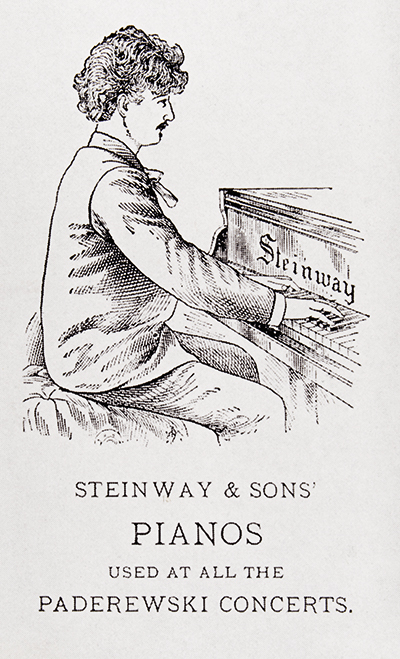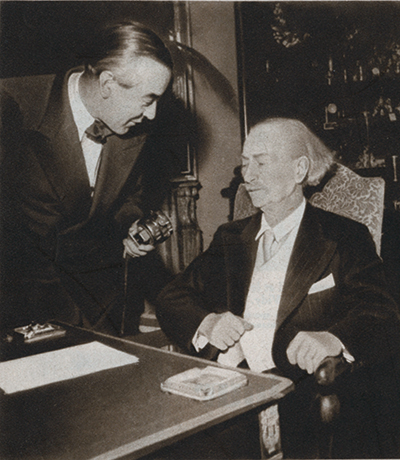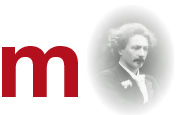 |
 |
 |
 |
 |
 |
 |
 |
 |
 |
 |
 |
 |
|||||||||||||||||||
1860 6th November: Ignacy Paderewski was born in Kurylowka, Podolia (now Ukraine) into a Polish family of minor gentry. His mother died a few months later. |
1863 His father was jailed on the grounds of his presumed involvement in the January Uprising. |
1872 He studied at the Warsaw Conservatory of music (1872-1878): oboe, clarinet, horn, bassoon, trombone and… piano! |
1876 First concert tour in Poland and Russia, self-produced, with fellow students. |
1878 Taught piano at the Warsaw Conservatory (1878-1883). |
1880 7th January: Married Antonina Korsak, who died ten months later soon after giving birth to their son Alfred, born with poliomyelitis (here pictured shortly before he passed away aged twenty). |
1881 Studied composition in Berlin with Friedrich Kiel and Heinrich Urban (1881-1883). |
1883 12th January: first public rendition of his compositions during a concert at the Hotel Roma in Berlin, accompanied by his violinist friend Ladislas Gorski. |
1884 Prepared for a pianist and concert artist career under the direction of Theodore Leszetycki in Vienna (1884-1886).4th October: first full house in Cracow thanks to the presence on stage, alongside Ignacy, of actress Helena Modrzejewska. |
1885 Taught piano at the Strasbourg Conservatory (1885-1886). |
1888 3rd March: a performance at the Erard Concert Hall in Paris launched his international career, which subsequently spanned two main eras: 1888-1917 and 1922-1939. |
1889 20th January: creation in Vienna of his Piano Concerto executed by Annette Essipoff-Leszetycka, second wife of his mentor, muse and « ambassadress ». |
1891 17th November: beginnings in New York and first American tour (109 concerts in 130 days!). |
1897 Spent holidays in Switzerland and moved to Riond-Bosson on the recommendation of Princess Rachel de Brancovan, patroness and friend. Paderewski bought the estate two years later and remained there until his final departure for the United States in 1940. |
1899 31st May: marriage in Warsaw with Helena Gorska, Baroness de Rosen, ex-wife of his friend Ladislas Gorski. |
1901 20th February: Alfred, his son, died aged twenty of poliomyelitis complications.29th May: premiere in Dresden of his only opera Manru. |
1906 First sound recordings on Welte-Mignon rolls. |
1910 15th July: official opening in Craców of the Grunwald Monument, and patriotic speech that marked the beginning of his public commitment to the Polish Cause. |
1913 March: bought two ranches in Paso Robles, California, named San Ignacio and Santa Helena (after their owners!).18th – 21st May: took part in Vevey in the Fêtes musicales in honour of Camille Saint-Saëns, organized by the Mayor Eugène Couvreu and composer Gustave Doret. |
1914 Co-founded in Vevey, along with Literature Nobel laureate Henryk Sienkiewcz, a central committee devoted to helping Polish war victims, which he represented in the United States from 1915 to 1918. Helena Paderewska created the Polish White Cross to help compatriots at war and their families. |
1917 Represented the Polish National Committee in Washington. Ignacy Paderewski submitted a memorandum on the Polish Question to President Wilson. He also formed a group of Polish volunteers in the United States who went to fight in France alongside the Allies. |
1918 In the name of First World War victors, the British Government invited him to assume authority in Poland.25th December: arrived in still-occupied Danzig. |
1919 5th January: triumphant welcome in Warsaw.17th January: called by Marshal Pilsudski to form a national unity government. Prime Minister and Foreign Affairs Minister for the Polish Republic from January to December 1919. Plenipotentiary Delegate at the Paris Peace Conference and signatory for Poland of the Treaties of Versailles (28th June) and Saint-Germain-en-Laye (10th September). |
1920 First Delegate for Poland to the Ambassadors’ Council and to the international conferences (July-December 1920). Chief Polish Delegate to the League of Nations in Geneva (from September 1920 to May 1921). |
1922 Back on international tours as a pianist. |
1932 25th June: concert at the Théâtre des Champs-Elysées to celebrate the centenary of Frederyk Chopin’s arrival in Paris, in the presence of the French President and of Queen Elisabeth of Belgium. |
1933 8th July: awarded Honorary Citizenship of the City of Lausanne, in the presence of Swiss Confederation President Edmund Schulthess. |
1936 Brought together several Polish opposition leaders under the name « Front de Morges », in an attempt to form a united front against the military that reigned over Poland with an iron fist. |
1937 Release of the movie Moonlight Sonata by Lothar Mendes, in which Paderewski played his own role. |
1939 President of the National Polish Council in Exile (from December 1939 until his death in June 1941). |
1940 June: appealed to the authorities and Swiss commander General Guisan in favour of the Polish soldiers interned in Switzerland.23rd September: left Riond-Bosson for the United States. Committed to pursue his fight for Poland, he was to never see Europe – the Old Continent – again. 29th September: broadcast of his farewell address to Switzerland on Radio-Lausanne. 5th November: arrived in New York and established the Paderewski Fund for Polish Relief. |
1941 29th June: died in New York of pneumonia. The official funeral took place in the National Cemetery of Arlington. |


